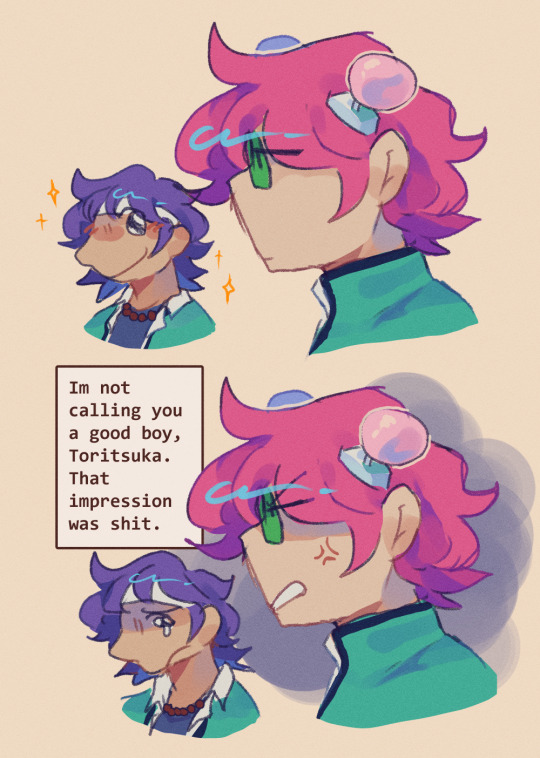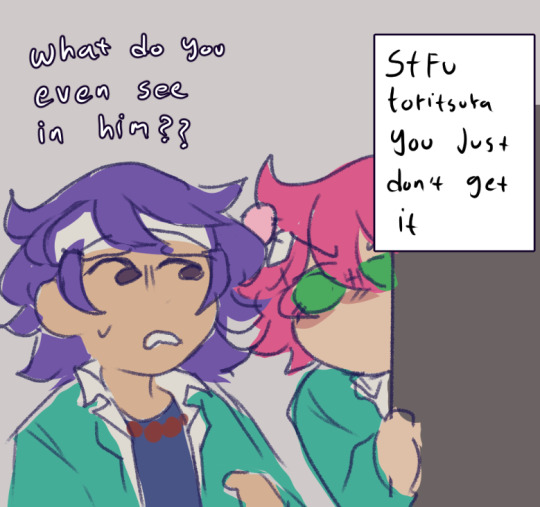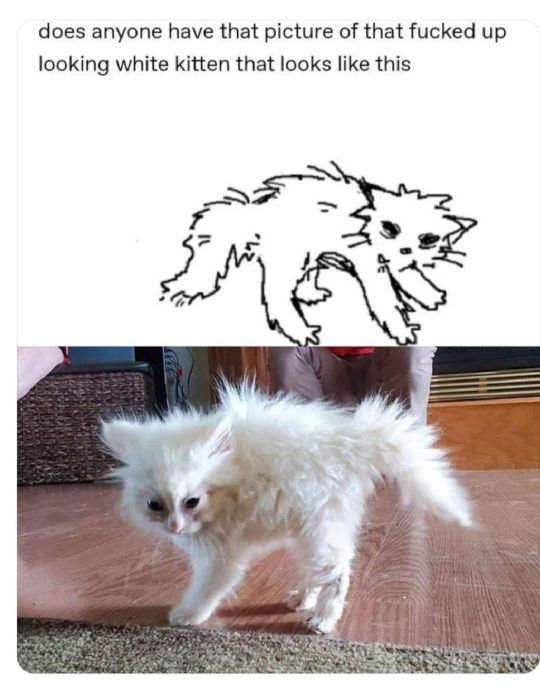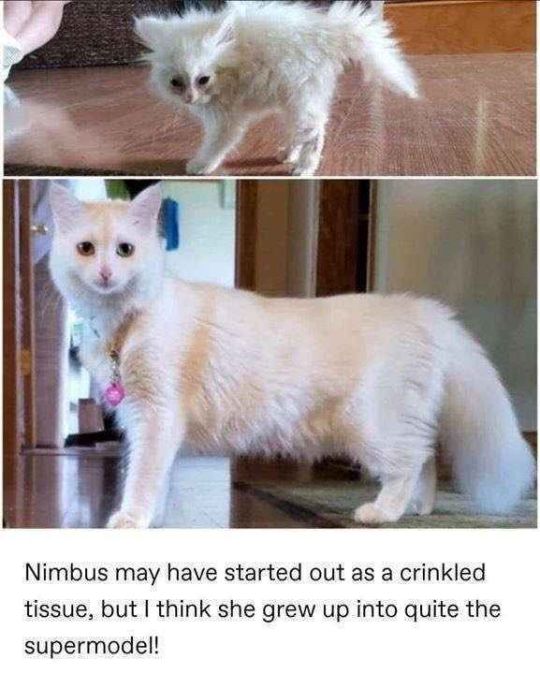Hylla, 21, she/theyWhy the fuck is the grandpa a pedophile? Why does anime feel like it’s a requirement to have at least one? Can’t we have none?
Last active 60 minutes ago
Don't wanna be here? Send us removal request.
Text

Thank you to everyone who got me to 500 likes!
0 notes
Text
if you ever tell me that you go to a chiro this is what i envision them doing to you
28K notes
·
View notes
Text
(I need to prove something to a friend)
11 notes
·
View notes
Text
Ranma and Akane in a nutshell

this is so fuckin funny
79K notes
·
View notes
Note
are you frequently overstimulated?
38K notes
·
View notes
Text
Now that more people know who squirrel girl is, I think nows a good time to share one of my favorite comic panels

22K notes
·
View notes
Photo
[Text Caption ID:
[“i have to kill him”
[“idk how to hit on him so he has to die”]

282K notes
·
View notes
Text
happy 110th to the christmas truce!
:3
And looking at all these kinsmen so arrayed, Arjuna, the son of Kunti,
Was overcome by deep compassion; and in despair he said: Krishna, when I see these my own people eager to fight, on the brink,
My limbs grow heavy, and my mouth is parched, my body trembles and my hair bristles,
My bow, Gandiva, falls from my hand, my skin’s on fire, I can no longer stand—my mind is reeling,
I see evil omens, Krishna: nothing good can come from slaughtering one’s own family in battle—I foresee it!
I have no desire for victory, Krishna, or kingship, or pleasures. What should we do with kingship, Govinda? What are pleasures to us? What is life?
The men for whose sake we desire kingship, enjoyment, and pleasures are precisely those drawn up for this battle, having abandoned their lives and riches.
Teachers, fathers, sons, as well as grandfathers, maternal uncles, fathers-in-law, grandsons, brothers-in-law, and kinsmen—
I have no desire to kill them, Madhusudana, though they are killers themselves—no, not for the lordship of the three worlds, let alone the earth!
Where is the joy for us, Janardana, in destroying Dhritarashtra's people? Having killed these murderers, evil would attach itself to us.
It follows, therefore, that we are not required to kill the sons of Dhritarashtra—they are our own kinsmen, and having killed our own people, how could we be happy, Madhava?
And even if, because their minds are overwhelmed by greed, they cannot see the evil incurred by destroying one’s own family, and the degradation involved in the betrayal of a friend,
How can we be so ignorant as not to recoil from this wrong?
~the bhagavad gita 1:27-39, johnson trans
56 notes
·
View notes
Text

I've been thinking about this show so much so hello tumblr, may i intrest you in the silly
also few teat doodle on how they'll look in my style below





2K notes
·
View notes
Text
The only time a man gets a say regarding someone’s abortion is when it’s his body being pregnant.
The only time a woman gets a say regarding someone’s abortion is when it’s her body being pregnant.
If you are not the pregnant one, you don’t get a say in someone’s abortion unless the pregnant person asks your opinion.
145K notes
·
View notes
Text
Recently I learned that Ranma 1/2 DOES have Martial Arts Tea Ceremony, but that doesn’t mean Sakyo couldn’t have precatcoced it!
Maybe the tutelage WAS how he became a tea ceremony expert!
”Martial Arts Tea Ceremony!”



THE ULTIMATE CROSSOVER?! /j
4 notes
·
View notes
Text
Writing Notes: Children's Dialogue
Language is extremely complex, yet children already know most of the grammar of their native language(s) before they are 5 years old.
BABBLING
Babbling begins at about 6 months and is considered the earliest stage of language acquisition
By 1 year babbles are composed only of the phonemes used in the language(s) they hear
Deaf babies babble with their hands like hearing babies babble using sounds
FIRST WORDS
After the age of one, children figure out that sounds are related to meanings and start to produce their first words
Usually children go through a holophrastic stage, where their one-word utterances may convey more meaning
Example: "Up" is used to indicate something in the sky or to mean “pick me up”
Most common first words (among the first 10 words uttered in many languages): “mommy,” “daddy,” “woof woof,” “no,” “bye,” “hi,” “yes,” “vroom,” “ball” and “banana”
WORD MEANINGS
When learning words, children often overextend a word’s meaning
Example: Using the word dog to refer to any furry, four-legged animal (overextensions tend to be based on shape, size, or texture, but never color)
They may also underextend a word’s meaning
Example: Using the word dog to refer only to the family pet, as if dog were a proper noun
The Whole Object Principle: When a child learns a new word, (s)he is likely to interpret the word to refer to a whole object rather than one of its parts
SYNTAX
At about two years of age, children start to put words together to form two-word utterances
The intonation contour extends over the two words as a unit, and the two-word utterances can convey a range of meanings:
Example: "mommy sock" = subject + object or possessive
NOTE: Chronological age is NOT a good measure of linguistic development due to individual differences, so instead linguists use the child’s mean length of utterance (MLU) to measure development
The telegraphic stage describes a phase when children tend to omit function morphemes such as articles, subject pronouns, auxiliaries, and verbal inflection
Examples: "He play little tune" or "Andrew want that"
Between 2;6 and 3;6 a language explosion occurs and children undergo rapid development
By the age of 3, most children consistently use function morphemes and can produce complex syntactic structures:
Examples: "He was stuck and I got him out" / "It’s too early for us to eat"
After 3;6 children can produce wh-questions, and relative pronouns
Sometime after 4;0 children have acquired most of the adult syntactic competence
PRAGMATICS
Deixis: Children often have problems with the shifting reference of pronouns
Children may refer to themselves as "you"
Problems with the context-dependent nature of deictic words: Children often assume the hearer knows who s/he is talking about
AUXILIARIES
In the telegraphic stage, children often omit auxiliaries from their speech but can form questions (with rising intonation) and negative sentences
Examples: "I ride train?" / "I not like this book"
As children acquire auxiliaries in questions and negative sentences, they generally use them correctly
SIGNED LANGUAGES
Deaf babies acquire sign language in the same way that hearing babies acquire spoken language: babbling, holophrastic stage, telegraphic stage
When deaf babies are not exposed to sign language, they will create their own signs, complete with systematic rules
IMITATION, REINFORCEMENT, ANALOGY
Children do imitate the speech heard around them to a certain extent, but language acquisition goes beyond imitation
Children produce utterances that they never hear from adults around them, such as "holded" or "tooths"
Children cannot imitate adults fully while acquiring grammar
Example:
Adult: "Where can I put them?" Child: "Where I can put them?"
Children who develop the ability to speak later in their childhood can understand the language spoken around them even if they cannot imitate it
NOTE: Children May Resist Correction
Example: Cazden (1972) (observation attributed to Jean Berko Gleason) – My teacher holded the baby rabbits and we patted them. – Did you say your teacher held the baby rabbits? – Yes. – What did you say she did? – She holded the baby rabbits and we patted them. – Did you say she held them tightly? – No, she holded them loosely.
Another theory asserts that children hear a sentence and then use it as a model to form other sentences by analogy
But while analogy may work in some situations, certainly not in all situations:
– I painted a red barn. – I painted a barn red. – I saw a red barn. – I saw a barn red.
Children never make mistakes of this kind based on analogy which shows that they understand structure dependency at a very young age
BIRTH ORDER
Children’s birth order may affect their speech.
Firstborns often speak earlier than later-born children, most likely because they get more one-on-one attention from parents.
They favor different words than their siblings.
Whereas firstborns gabble on about animals and favorite colors, the rest of the pack cut to the chase with “brother,” “sister,” “hate” and such treats as “candy,” “popsicles” and “donuts.”
The social dynamics of siblings, it would appear, prime their vocabularies for a reality different than the firstborns’ idyllic world of sheep, owls, the green of the earth and the blue of the sky.
MOTHER'S LEVEL OF EDUCATION
Children may adopt vocabulary quite differently depending on their mother’s level of education.
In American English, among the words disproportionately favored by the children of mothers who have not completed secondary education are: “so,” “walker,” “gum,” “candy,” “each,” “could,” “wish,” “but,” “penny” and “be” (ordered starting with the highest frequency).
The words favored by the children of mothers in the “college and above” category are: “sheep,” “giraffe,” “cockadoodledoo,” “quack quack,” the babysitter’s name, “gentle,” “owl,” “zebra,” “play dough” and “mittens.”
BOYS / GIRLS
One area of remarkable consistency across language groups is the degree to which the language of children is gendered.
The words more likely to be used by American girls than by boys are: “dress,” “vagina,” “tights,” “doll,” “necklace,” “pretty,” “underpants,” “purse,” “girl” and “sweater.”
Whereas those favored by boys are “penis,” “vroom,” “tractor,” “truck,” “hammer,” “bat,” “dump,” “firetruck,” “police” and “motorcycle.”
Tips for Writing Children's Dialogue (compiled from various sources cited below):
Milestones - The dialogue you write should be consistent with the child's developmental milestones for their age. Of course, other factors should be considered such as if the child has any speech or intellectual difficulties. Also note that developmental milestones are not set in stone and each child is unique in their own way.
Too "Cutesy" - If your child characters are going to be cute, they must be cute naturally through the force of their personality, not because the entire purpose of their existence is to be adorable.
Too Wise - It’s true kids have the benefit of seeing some situations a little more objectively than adults. But when they start calmly and unwittingly spouting all the answers, the results often seem more clichéd and convenient than impressive or ironic.
Unintelligent - Don’t confuse a child’s lack of experience with lack of intelligence.
Baby Talk - Don’t make a habit of letting them misuse words. Children are more intelligent than most people think.
Unique Individuals - Adults often tend to lump all children into a single category: cute, small, loud, and occasionally annoying. Look beyond the stereotype.
Personal Goals - The single ingredient that transforms someone from a static character to a dynamic character is a goal. It can be easy to forget kids also have goals. Kids are arguably even more defined by their goals than are adults. Kids want something every waking minute. Their entire existence is wrapped up in wanting something and figuring out how to get it.
Don't Forget your Character IS a Child - Most of the pitfalls in how to write child characters have to do with making them too simplistic and childish. But don’t fall into the opposite trap either: don’t create child characters who are essentially adults in little bodies.
Your Personal Observation - To write dialogue that truly sounds like it could come from a child, start by being an attentive listener. Spend time around children and observe how they interact with their peers and adults. You can also study other pieces of media that show/write about children's behaviour (e.g., documentaries, films, TV shows, even other written works like novels and scripts).
Context - The context in which children speak is crucial to creating realistic dialogue. Consider their environment, who they're speaking to, and what's happening around them. Dialogue can change drastically depending on whether a child is talking to a friend, a parent, or a teacher. Additionally, children's language can be influenced by their cultural background, family dynamics, and personal experiences. Make sure the context informs the dialogue, lending credibility to your characters' voices.
Sources and other related articles: 1 2 3 4 5 6 7 8 9 10
Writing Notes: On Children ⚜ Childhood Bilingualism More: Writing Notes & References
5K notes
·
View notes
Text
Dealing With Executive Dysfunction - A Masterpost
The “getting it done in an unconventional way” method.
The “it’s not cheating to do it the easy way” method.
The “fuck what you’re supposed to do” method.
The “get stuff done while you wait” method.
The “you don’t have to do everything at once” method.
The “it doesn’t have to be permanent to be helpful” method.
The “break the task into smaller steps” method.
The “treat yourself like a pet” method.
The “it doesn’t have to be all or nothing” method.
The “put on a persona” method.
The “act like you’re filming a tutorial” method.
The “you don’t have to do it perfectly” method.
The “wait for a trigger” method.
The “do it for your future self” method.
The “might as well” method.
The “when self discipline doesn’t cut it” method.
The “taking care of yourself to take care of your pet” method.
The “make it easy” method.
The “junebugging” method.
The “just show up” method.
The “accept when you need help” method.
The “make it into a game” method.
The “everything worth doing is worth doing poorly” method.
The “trick yourself” method.
The “break it into even smaller steps” method.
The “let go of should” method.
The “your body is an animal you have to take care of” method.
The “fork theory” method.
The “effectivity over aesthetics” method.
196K notes
·
View notes






